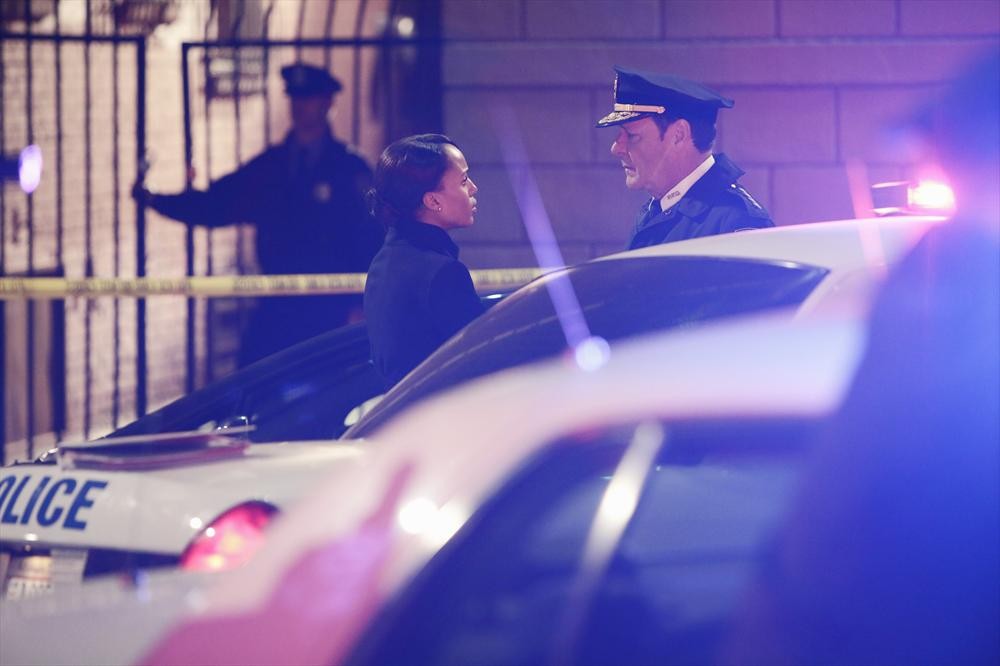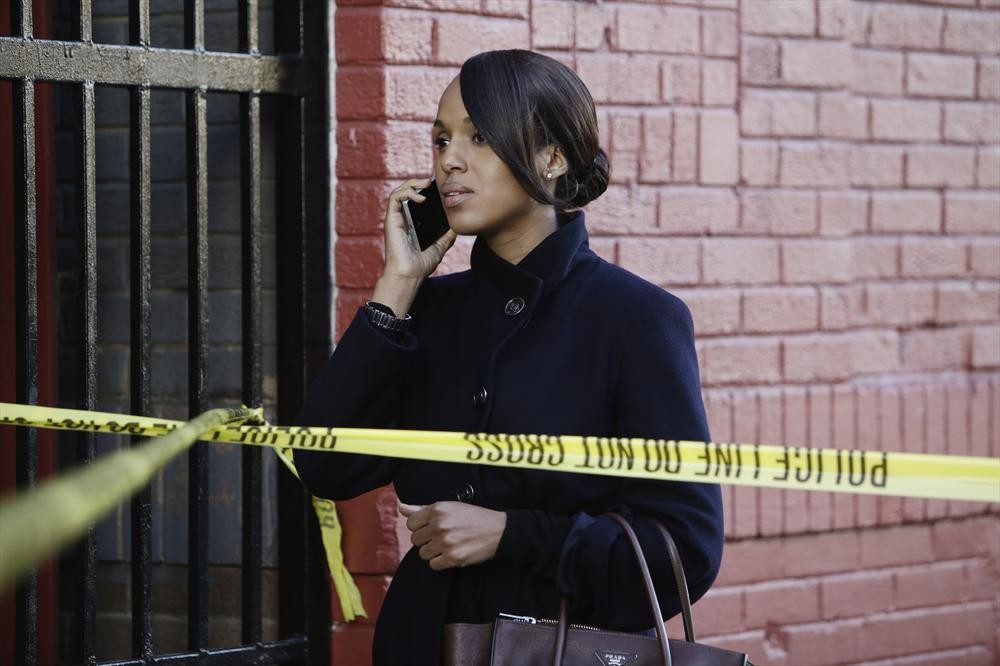'Scandal' Just Handled America's Racial Tensions in a Powerful Way
By:
If you're a fan of ABC's Scandal and haven't seen Thursday, March 5th episode, turn away now, because this post contains major spoilers.
On Thursday night, Olivia Pope tried to figure out what justice looks like in the face of institutionalized oppression. The character at the center of ABC's hit drama, Scandal (played by Kerry Washington), had her crisis management skills called upon to assist the D.C. Metro police when an officer shoots a young black boy in the street for seemingly no reason. It's no surprise the series — run by prolific television showrunner/boss-lady Shonda Rhimes — decided to tackle the issue of our current racial tensions, but the empathetic handling of not only the situation but the characters involved proved that, contrary to popular rhetoric, there IS a way to do this better. Through dismantling institutionalized expectations and focusing on the emotional scars this centuries-long battle has created, America might finally be able to heal — and justice of a sort may actually prevail.
The episode, titled "The Lawn Chair," told the story of an unarmed black 17-year-old, Brandon Parker upon being shot by a 32-year-old white police officer in the streets of the boy's southeast Washington neighborhood. Grief-stricken and angry, his father Clarence (played by Courtney B. Vance) showed up, shotgun in hand, determined to protect his son while simultaneously demanding the name of the officer that shot his boy.
A protest quickly emerges after a local activist arrives with a lawn chair, encouraging Clarence to sit down and, in turn, stand up against the injustice that has occurred — his son was a good kid, never in trouble — and the cops scramble to respond. They react, emotional and defensive, calling out for riot gear and protection of and from the mob of people forming. But thankfully, they have Olivia Pope on their side. Her calm rationale, her ability to look at a situation without bias, is what gets the job done and moves the series forward. But when the job is defending those who would rather defend themselves and their point of view and their mistakes, the choice for Olivia becomes clear: we stand with those whose lives have been in the cross hairs, innocent bystanders of institutionalized racism. A fear that begets other fears and begins the cycle of volatile distrust.

It also shined a very real light on the constant struggle it can be for minority voices to even be heard. How the idea of "there are laws and processes in place" — as the show's U.S. Attorney General so posits — ultimately is what causes the issue in the first place. As the shooting makes its way onto national news, Olivia demands his presence at the crime scene — a gesture to show that, for once, these crimes are being taken as serious — and later demands to watch footage of the shooting (footage that could prove Brandon was innocent), but she is constantly rebuffed at every turn, told this is just how the justice system operates. A justice system whose failings allowed for an attempted cover-up by the police officer in question.
Thankfully, Olivia managed to uncover this lie — a planted knife on the boy committed by the officer who shot him — and the cop was ultimately arrested. It was a happy ending (sadly, ironically) to a story that was ambitious in its goals and execution: talking about our country's systemic injustice towards black people in these modern times — in under an hour! — is no small feat. And it's far from easy — both to create AND get on air. There are so many sides to the story, but Scandal cut right to the heart of the biggest issue facing this problem. Fear.
Fear is what drives these officers to be trigger happy; fear is what causes people questioned by police to be defensive. It is fear that these shootings will be nothing more than yet-another case of a black person being wrongly accused of something and paying the ultimate price for it, that brings the demonstrators and protests out; fear that this fear will breed more fear. It's a cyclical mess with seemingly no end in sight.

...Unless, of course, you do the extraordinary and try to break the cycle. To stop denying the facts, regardless of intention, and focus on the lost human life at the center of the problem — exactly what Olivia Pope did. What made this episode all the more powerful, was its empathetic handling of EVERY point of view on the series. From the cops to the father to the protestors -- the episode expertly pinpointed the emotional essence of why these people believe what they do, even if it ultimately results in a misguided conclusion or action. Saying something out loud not only allows for a personal, more deeper understanding of what it is we think and feel, but it ultimately paves a path towards healing. Something this country oh-so-desperately needs to do. Because when we talk and listen and understand, resentments fall to the wayside, ignorance is combated with knowledge, and we all end up in a better, more enlightened place — even if that place is but a mere baby step from where it was before. Every little bit matters, every baby step counts. You don't scale a mountain in a single jump.
Of course some could argue that's exactly what this single episode of television did: traverse the conversation about how and why this keeps happening all while finding a non-violent solution as a result.
It is a sad fact of the world that, though we chant and hashtag things like "All Lives Matter," it is not an ingrained and understood fact in this country. The onus is on all of us to not rest easy, living in the way things were/are, but to take personal ownership of our own privileges and prejudices. It is not an easy thing to do, but it is necessary: we all have to feel and see each other's pain to better understand it. That's what will ultimately solve racism and end racial tensions — a cycle from which we all suffer and in which our society is trapped. Then — to paraphrase the refrain in the Nina Simone cover of Bob Dylan that played as they zipped the body bag over 17-year-old Brandon's face — any day now, any day now, we shall be released.
